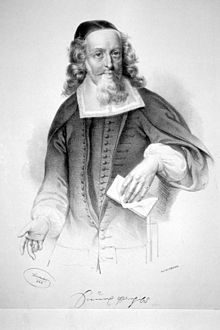Samuel Oppenheimer
Samuel Oppenheimer (born June 21, 1630 in Heidelberg ; † May 3, 1703 in Vienna ) was a court factor and diplomat of the 17th century at the Viennese court Leopold I.

Life
Oppenheimer had a friendly relationship with the Austrian general and patron of the arts, Prinz Eugen, and played an important role in financing the Turkish wars as his army supplier and financier . In this way he made it possible for Prince Eugene to send medical aid for his troops. The cause geschafften of Prince Eugen for Oppenheimer from Turkey Hebrew manuscripts formed the basis for the David Oppenheimer - Library , now part of the Bodleian Library at Oxford University . Although the Jews in Vienna had been expelled by Leopold I in 1670 , the latter asked Oppenheimer to settle there. He was granted the privilege of building a house in the heart of Vienna. He was appointed Oberhofaktor and court Jew Ludwig von Baden , to whom he made 100,000 guilders available for war expenses. He also held the office of "Jewish Bishop" of Worms, who was the highest representative of the Jewish population in the city.
In 1697 he was arrested for a month through an anti-Semitic intrigue by Cardinal Kollonitsch because he had allegedly planned to murder a competitor. Because the Prussian court Jew Ruben Gomperz was also involved, there was a lengthy diplomatic exchange with Berlin.
Around 1700 a riot broke out among the population in Vienna, houses were stormed and looted. A man was hanged and other accomplices imprisoned for the looting of Oppenheimer's property, which was a favorite of the emperor. When Austria's treasury faced bankruptcy in 1701 as a result of the outbreak of the War of the Spanish Succession , Oppenheimer made the necessary funds available to cope with the financial crisis.
His loans, with 12 to 20% interest, represented the largest item under Austria's debts at the time. They are said to have amounted to around six million guilders, which Oppenheimer had largely refinanced through third parties. After his death, Austria got rid of these debts by not repaying them, but rather by bankruptcy disposing of his estate. The imperial declaration of bankruptcy plunged all financiers connected with Oppenheimer into a serious crisis and, demonstrably, the Frankfurt Stock Exchange as well .
Samuel Oppenheimer died in 1703 and was buried in the Rossau Jewish cemetery .
family
Oppenheimer had at least five sons and three daughters:
- Simon Wolf Oppenheimer (* around 1650 in Vienna; † November 10, 1726 in Hanover ) moved to Hanover and founded a bank there. He was married to Fradel Behrens († May 2, 1717), a granddaughter of Leffmann Behrens .
- Daniel Moses (* around 1656; † 1675/1677 in Worms ). His son Jehuda Loeb Oppenheimer married Simelie Behrens († 1739), a granddaughter of Leffmann Behrens
- Nathan Oppenheimer († 1730 in Vienna)
- Mendel Menachem Emanuel Oppenheimer (* 1657; † September 13, 1721 in Vienna ) was married to Judith Jutta Tamar Gomperz (* 1671; † April 18, 1738 in Vienna). He succeeded his father in the office of Jewish bishop (community leader) of Worms. Their son Baer Mendel (Emanuel) Oppenheim (* 1709; † June 21, 1753), married Maria Gude Benedictus Gomperz (* in Nijmegen; † before 1755).
- Lea Oppenheimer († April 26, 1705) married Mendel Emanuel Drach (Trach) († October 15, 1744 in Frankfurt a. M.).
- Frumet Oppenheimer († 1713 in Frankfurt am Main) married Josef Guggenheim (* approx. 1660 in Lengnau ; † 1735 in Frankfurt am Main).
- Abraham Oppenheimer († 1753)
- Schoendele Oppenheimer married Lob Deutz "zur Arche" († 1711?).
- Jehuda Wolf Oppenheimer († 1732 in Bratislava ) married Simche.
literature
- Constantin von Wurzbach : Oppenheim, Samuel (in the article of his nephew) . In: Biographisches Lexikon des Kaiserthums Oesterreich . 21st part. Kaiserlich-Königliche Hof- und Staatsdruckerei, Vienna 1870, p. 75 ( digitized version ).
- Josef Mentschl: Samuel Oppenheimer. In: New German Biography (NDB). Volume 19, Duncker & Humblot, Berlin 1999, ISBN 3-428-00200-8 , p. 569 f. ( Digitized version ).
Web links
- Figure Portrait of Samuel Oppenheimer
- http://www.hohenemsgenealogie.at/gen/getperson.php?personID=I17135&tree=Hohenems
Individual evidence
- ↑ Fritz Reuter : Wamaisa. 1000 years of Jews in Worms . 3. Edition. Self-published, Worms 2009. ISBN 978-3-8391-0201-5 , p. 140.
- ↑ Fritz Reuter : Wamaisa. 1000 years of Jews in Worms . 3. Edition. Self-published, Worms 2009. ISBN 978-3-8391-0201-5 , p. 140.
| personal data | |
|---|---|
| SURNAME | Oppenheimer, Samuel |
| BRIEF DESCRIPTION | Moneylender, army supplier, court administrator and diplomat in the Holy Roman Empire |
| DATE OF BIRTH | June 21, 1630 |
| PLACE OF BIRTH | Heidelberg |
| DATE OF DEATH | May 3, 1703 |
| Place of death | Vienna |